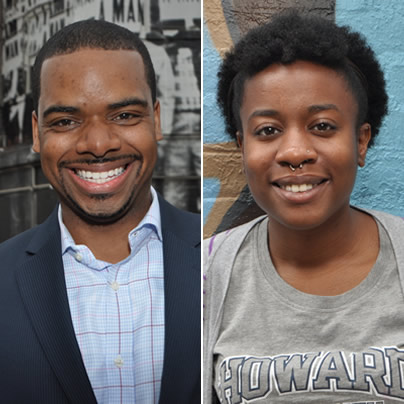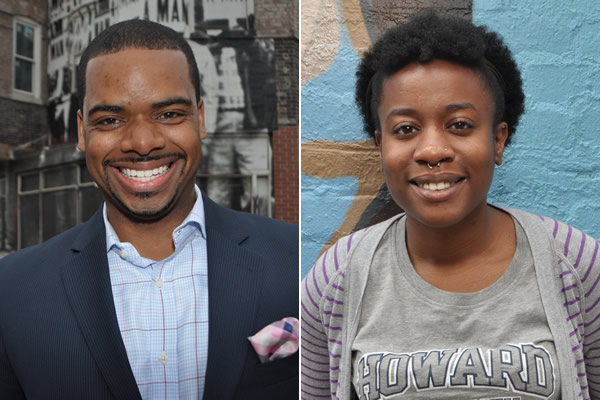Living
Beacons of a new generation
D.C. Black Pride honoring youth at ceremony Friday


Christopher Watson and Theara Coleman are being honored at this weekend’s D.C. Black Pride festivities. (Washington Blade photo by Michael Key)
When the 23rd annual D.C. Black Pride festivities begin Friday in the Thornton Room at the Hyatt Regency Washington Capitol Hill (400 New Jersey Ave.), it will be a night devoted to paying tribute to those who have done something special for the LGBT community.
Mayor Vincent Gray will be awarded the Eleanor Holmes Norton Award for his work fighting for LGBT rights. Dr. Imani Woody and Courtney Williams will be recipients of the Welmore Cook Award, each honored for their strong community involvement.
Two names that might not be as familiar — at least not yet — are Theara Coleman and Christopher Watson. For the first time, D.C. Black Pride will present a leadership award to black LGBT community leaders who are 30 years old or younger and these recent graduates are the inaugural honorees.
Hailing from the projects of Brooklyn, N.Y., Coleman is the daughter of a retired NYPD police officer and a stay-at-home mom who is active in social services. With support from her family, Coleman was able to thrive as an LGBT student and received a scholarship from Howard University, graduating earlier this month.
In college, Coleman was an English major and an African-American Studies minor and spent time away from the classroom concentrating on civic and social services, especially when it came to LGBT issues.
“All four years I was at Howard I was involved with working with Cascade, the LGBT organization on campus. I started out doing event planning to spread awareness, and I ended up being vice president and subsequently president for two years,” Coleman says. “A lot of our work was trying to create a better understanding on campus so the school can feel the presence of the LGBT community and see the importance of recognizing us as a community at Howard and our need for resources.”
Coleman says her efforts have helped pave the way for future LGBT Howard students to have an easier time with other students and the administration.
Outside of her work at Howard, the 22-year-old also interned with the ACLU, writing blogs about her experiences of being an LGBT student in high school and college and assisting on research and grant writing.
“That pushed me to get an internship with Stonewall Democrats and I learned about all the policy that has to do with LGBT rights because the majority of what we were doing was how officials running for office were addressing LGBT issues,” she says. “I also served for a short time with Obama for America as an LGBT outreach coordinator, reaching out to the community to get more LGBT voters out to put Obama back in office.”
Coleman also works as a mentor to students in transitional housing and volunteers at a variety of other organizations. Having just graduated, she is currently looking for a job that will help her utilize her skills and help others in the process.
She’s thinking about something in the non-profit field where she can help with grant writing. Her dream job is to help LGBT youth in high school and use her experiences to show them how to navigate the world once they get into college and enter the real world.
As for the award, Coleman says she is humbled that she was chosen and dedicates it to her mentor, Victoria Kirby, who has been her inspiration throughout her Howard years.
“It means a lot to me because of all the work I have been doing in undergrad and how much I have immersed myself in pushing for LGBT rights and I appreciate that all the leg work I have done is being recognized,” Coleman says. “It means I am heading in the right direction with what I want to accomplish in life.”
Also heading in the right direction is Watson, who works as the clinical research site director at George Washington University, while he works on a master’s of public health degree in epidemiology. He has a bachelor’s of science in biology from the North Carolina Agricultural and Technical State University.
The country boy from North Carolina has been doing public health work for more than a decade.
“I started in North Carolina in response to the outbreak of HIV infections among college-aged men in 2003,” he says. “I moved in 2005 to study pharmaceutics at Howard but decided within a year that it was not for me and my goal — thanks to a mom who said I couldn’t move back home so work it out in D.C. — was to make it in corporate America.”
That decision led Watson to a job at Bank of America. Soon after, GW approached him to join its public health team as its clinical research site director, working on HIV and other issues.
“It’s been one of the best decisions I ever made,” he says. “I love public health. I love helping people and I love making a difference in individual lives.”
Watson’s responsibilities include community mobilization and engagement in the local community. He’s become a strong advocate in the national scene for additional funding for black gay men.
“I would ultimately like to have an influence in policy development as it relates to African-American health and look at how we can build on the existing research and also begin to revise and develop new policies that are culturally congruent for the lives of African Americans,” he says.
Watson is looking forward to tonight’s awards and his proud mom will be on hand to watch him receive the award.
“It’s a surreal experience. It’s rewarding to know your sacrifices don’t go unnoticed but if no one knew my name, I would be happy,” he says. “I appreciate it. I’m grateful to have this moment, and I share this award with my colleagues, family and friends who give me the support structure to do the work at the level I’m able to do it.”
Autos
Going for gold: Ford Bronco Sport vs. Toyota RAV4
SUV world has share of bright lights, bold entrances, cut-throat competitors

Let the games begin! Just like the Winter Olympics this month, the SUV world has its share of bright lights, bold entrances, and cut-throat competitors.
Enter the Ford Bronco Sport and Toyota RAV4, both ready to claim the podium but each with a different routine. Think hiking boots versus minimalist trainers. Dirt trails versus perfectly paved roadways.
FORD BRONCO SPORT
$34,000
MPG: 25 city/30 highway
0 to 60 mph: 8.2 seconds
Cargo space: 32.5 cu. ft.
PROS: Boxy chic. Off-road ready. Easy-clean interior.
CONS: Meh gas mileage. Firm ride. Outside noise.
The Bronco Sport doesn’t try to blend in — and that’s the point. With an upright stance, squared lines and retro-rugged styling, this compact SUV looks ready for a backcountry photoshoot before you’ve even left the driveway.
Power comes from a three-cylinder turbo engine that handles daily driving with ease. Opt for the four-cylinder turbo, and the personality shifts from relaxed to assertive. Passing power improves. Highway merges are confident rather than cautious.
The standard 4×4 system sets the tone immediately. Traction is constant. Confidence is built in. Add the G.O.A.T. drive trains (in Ford cute-speak, this means “Goes Over Any Terrain”), and the Bronco Sport adapts to mud, sand, snow and rocks like a decathlete moving between events. Higher trims add skid plates, upgraded suspension and special hardware that makes rough territory feel less intimidating.
On pavement, the Bronco Sport is stable and composed, though the firm suspension can be ass-busting over deep potholes and such. And wind noise at highway speeds is kinda annoying, a tradeoff for the boxy profile.
Inside, durability meets thoughtful design. Rubberized surfaces and easy-clean materials welcome muddy boots, sandy paws or ambitious weekend projects. The cargo area features a flip-up rear window and adjustable floor, making it a breeze to load gear. Storage cubbies and nylon straps keep equipment organized without fuss.
Safety and other tech amenities are modern and practical. Wireless smartphone integration, cameras and driver-assistance gizmos such as adaptive cruise control make daily driving and long trips easier to manage.
What truly sets this SUV apart? In a sea of aerodynamic lemmings, the Bronco Sport feels like a free spirit. Rugged. Confident. A little rebellious.
And, like alpine skier Breezy Johnson, it looks particularly good with a bit of trail dust.
TOYOTA RAV4

$34,000
MPG: 47 city/40 highway
0 to 60 mph: 7.1 seconds
Cargo space: 37.8 cu. ft.
PROS: Fuel savvy. Spacious. Tech-laden features.
CONS: Less-sporty ride. Blasé base trim. Pricey options.
If the Bronco Sport is the adventurous wanderer, the Toyota RAV4 is the precision athlete who arrives early, stretches properly and performs effortlessly. Cue figure skaters Amber Glenn or Paul Poirier and you get the picture.
Fully redesigned for 2026, this compact SUV retains a formula that has made it one of the best-selling vehicles in America, blending efficiency, versatility and lots of tech features.
Toyota nixed the traditional gas engine for the RAV4, but that’s just fine. All models are now either standard hybrids, with fuel economy in the mid-40 mpg range, or plug-in hybrids, which can go up to 50 miles on battery power alone. The result: Vehicles that can handle daily commutes in near silence while retaining long-distance flexibility that would make an Olympic coach proud.
Acceleration is smooth and responsive, particularly in the plug-in hybrid, which is surprisingly quick. The transition between electric and gas power is seamless, though heavy throttle inputs mean the engine sometimes sounds strained. Handling is more predictable than sporty, so this was a minor deduction on the RAV4’s scorecard … at least from me.
But overall comfort is outstanding. The suspension absorbs potholes and uneven pavement with ease, and cabin noise remains impressively low at highway speeds. Long road trips feel relaxed rather than fatiguing — less triathlon grind, more victory lap.
Toyota’s Safety Sense offers adaptive cruise control, lane-keeping assist, enhanced collision avoidance and other systems that operate smoothly without seeming intrusive.
Inside, the revamped cabin is user-friendly. Materials are more refined than before, especially in mid- and upper-level trims. A large, high-resolution touchscreen supports the latest apps, voice commands and over-the-air updates. Such a layout is intuitive instead of flashy — stylish athleisure rather than couture.
Passenger space is generous, and cargo capacity remains among the most practical in this segment. The wide opening is especially helpful when tossing in luggage, sports equipment or an overly optimistic warehouse haul.
For drivers like me who are quick to judge efficiency, reliability and daily usability, the RAV4 delivered a gold-medal performance.

Valentine’s Day is often portrayed as a celebration of romantic love — flowers, chocolates, and candlelit dinners. But for many LGBTQ+ individuals and couples, Valentine’s Day can also be a moment to reflect on something deeper: the love that creates a safe, welcoming home.
For LGBTQ+ home buyers and sellers, homeownership is more than a financial milestone—it is an act of belonging, resilience, and pride. Owning a home can mean finally having a place where you can hold hands with your partner on the front porch, decorate with your authentic style, and build a life free from judgment. In this way, buying or selling a home is one of the most meaningful love stories many LGBTQ+ people will ever write.
This Valentine’s Day, whether you’re a first-time gay home buyer, a same-sex couple upgrading your space, or an LGBTQ+ seller moving on to your next chapter, it’s worth thinking about how love, identity, and real estate intersect—and how to navigate that journey with confidence, protection, and the right support.
Love, Identity, and the Meaning of ‘Home’
For generations, LGBTQ+ people were denied equal access to housing, homeownership, and legal protections. Even today, many LGBTQ+ home buyers still face subtle bias, uncomfortable interactions, or outright discrimination in the real estate process.
That’s why finding LGBTQ+ friendly real estate and an affirming gay friendly realtor or lesbian realtor matters so much. A home isn’t just a building—it’s a personal sanctuary. Working with LGBTQ+ real estate agents who understand your lived experience can make all the difference between a stressful transaction and a joyful one.
For over 30 years, GayRealEstate.com has been the leading gay real estate network, connecting LGBTQ+ home buyers and sellers with gay real estate agents, lesbian real estate agents, and LGBTQ+ friendly realtors who truly “get it.” Their mission has always been simple yet powerful: to ensure that every LGBTQ+ person has access to safe, respectful, and inclusive real estate services.
Finding Your Match: Choosing the Right LGBTQ+ Friendly Realtor
Much like dating, finding the right real estate agent is about compatibility, trust, and communication. Here are some key tips for choosing the best LGBTQ+ real estate representation:
- Look for experience with LGBTQ+ clients. Search for a gay realtor near me or lesbian realtor near me through GayRealEstate.com, where agents are vetted for cultural competency and community commitment.
- Ask about their experience with same-sex couple home buying. A strong agent should understand issues like joint ownership, legal protections, and financing considerations.
- Choose someone who listens. You should feel safe sharing your priorities—whether that includes proximity to LGBTQ+ nightlife, affirming schools, or lesbian-friendly neighborhoods.
- Prioritize respect and transparency. Your agent should advocate for you, not just push a quick sale.
The right gay friendly real estate agent isn’t just helping you buy a house—they’re helping you find a place to build your life.
Best Cities for LGBTQ+ Home Buyers
If love is your compass, location is your map. Some of the best cities for LGBTQ+ home buyers consistently offer strong community presence, legal protections, and welcoming neighborhoods:
- Wilton Manors, Florida – A hub for LGBTQ+ culture with thriving LGBTQ+ real estate opportunities
- Palm Springs, California – A long-standing LGBTQ+ retirement and second-home destination
- Provincetown, Massachusetts – Historic LGBTQ+ community with progressive housing protections
- Asheville, North Carolina – Growing market with inclusive real estate services
- Fort Lauderdale, Florida – Diverse, welcoming, and highly sought-after for LGBTQ+ home ownership
Working with GayRealEstate.com allows you to connect with local LGBTQ+ real estate experts who know these markets inside and out.
Navigating Legal Protections in LGBTQ+ Real Estate
Love is universal—but legal protections are not always consistent. Understanding your rights is essential when buying or selling a home as an LGBTQ+ person.
Key protections include:
- Fair Housing Act (FHA): Prohibits discrimination based on sex, which courts have increasingly interpreted to include sexual orientation and gender identity.
- State and local protections: Many cities and states offer additional safeguards against LGBTQ+ housing discrimination.
- Same-sex couple legal considerations: If you are married, joint ownership is typically straightforward. If not, consult an attorney about co-ownership agreements.
A knowledgeable LGBTQ+ friendly realtor from GayRealEstate.com can help guide you through these complexities and connect you with trusted legal professionals when needed.
Buying a Home as an LGBTQ+ Person: Practical Tips
If you’re embarking on your home-buying journey this Valentine’s season, here are smart, practical steps to take:
- Clarify your priorities. Do you want a vibrant LGBTQ+ neighborhood, quiet suburbs, or access to queer community spaces?
- Get pre-approved for a mortgage. This strengthens your position in competitive markets.
- Work with an LGBTQ+ real estate agent. Searching “finding a gay real estate agent” or “finding a lesbian real estate agent” through GayRealEstate.com is a great first step.
- Research inclusive communities. Some neighborhoods are more welcoming than others.
- Know your rights. If you experience bias, document it and seek legal guidance.
Buying a home is an act of self-love—and community love.
Selling a Home as an LGBTQ+ Person
Selling can be just as emotional as buying, especially if your home represents years of memories with your partner, friends, or chosen family.
When selling a home as an LGBTQ+ person, consider:
- Working with a gay friendly realtor who will market your home inclusively
- Highlighting LGBTQ+ community appeal in listings
- Being prepared for potential buyer bias (and knowing how to respond)
- Leaning on GayRealEstate.com’s LGBTQ+ real estate services for trusted guidance
Your story—and your home—deserve respect.
Real Estate for LGBTQ+ Families
More LGBTQ+ couples are raising children, fostering, or building blended families. This makes homeownership even more meaningful.
When searching for real estate for LGBTQ+ families, consider:
- LGBTQ+ affirming school districts
- Family-friendly queer communities
- Safe neighborhoods with inclusive values
- Access to LGBTQ+ resources and social networks
GayRealEstate.com specializes in helping LGBTQ+ families find homes that truly fit their lives.
Love, Pride, and Homeownership
At its core, Valentine’s Day is about connection. For LGBTQ+ people, homeownership can be one of the most profound expressions of love—love for yourself, your partner, your family, and your future.
Whether you are a first-time gay home buyer, a same-sex couple relocating, or an LGBTQ+ seller moving forward, you deserve an experience rooted in dignity, fairness, and celebration.
For over three decades, GayRealEstate.com has stood as the leading source for LGBTQ+ real estate, gay real estate, lesbian real estate, and LGBTQ+ home buying and selling representation. Their nationwide network of gay real estate agents, lesbian-friendly real estate agents, and LGBTQ+ friendly realtors ensures that your real estate journey is guided by professionals who understand your heart—and your home.
This Valentine’s Day, let your next chapter be written in a place where you can truly belong. Because when love leads the way, home is never far behind.
Scott Helms is president and owner of Gayrealestate.com.

Dear Michael,
I keep getting rejected on the apps. I don’t want to put myself out there anymore.
I don’t understand gay men. I think they behave really badly.
Guys stop replying in the middle of a text conversation and then un-match me. Guys don’t show up when we make a plan to meet. After a date or even a hookup that it seems clear we both enjoyed, I never hear from the guy again.
I am a pretty good looking and successful guy. I’m not a model or a billionaire but I’m sincerely wanting to date and eventually share a life with someone.
Unfortunately, everyone I am meeting, even if they say they have similar aspirations for a partner, acts like they’re looking over my shoulder for something better, and drops me for I-don’t-know-what reason.
I don’t have a lot of trust in the sincerity of gay men.
I know I sound bitter but I’ve been at this for a while and it keeps happening.
I know there’s a saying that if it keeps happening to you, you must be the problem. Logically that makes sense.
Except, I think this keeps happening so often and so predictably that it’s not me. These people hardly know me. It’s more along the lines of, if everything about me isn’t exactly what they want, or some little thing that I say, think, or do offends them, they vanish.
I’m lonely, but what’s out there is awful. Maybe it’s best to not keep trying.
If you have a different way of seeing it that’s honest, not just some fluff to make me feel better and be hopeful, please enlighten me.
Michael replies:
I agree with you, there is a lot of this kind of behavior out there. I hear stories similar to yours all the time. Though people do find great relationships online, relying on apps to meet a partner can be tricky.
Hookup apps have little to do with any kind of real connection. Often, they don’t even have much to do with sex. For a lot of people, they’re more about trying to fill up some kind of emptiness and seeking validation. They also, obviously, objectify men, which is the opposite experience of what you’re seeking.
And dating apps lend themselves to a sort of takeout menu concept of dating. You get to specify exactly what you’re looking for—a little of this, a lot of that, please omit something else—and then believe you should get what you ordered. As if that really exists. And when something isn’t just what you wanted, forget it.
But life doesn’t work that way. Nor do people: You can enter the exact criteria for the man of your dreams, but he will surprise you or let you down at times in some major ways. That’s how it goes. Part of being in a relationship is accepting that we all have to deal with imperfection.
All that said, hordes of people are going to keep using all sorts of apps and keep looking for “perfect” partners and keep ditching perfectly fine guys for the most minuscule of reasons.
But that doesn’t mean that you have to stay on the apps if it’s demoralizing you and leaving you hopeless.
Before you sign off, perhaps you would like to have some fun and be creative. Just for example, you could write in your profile that you’re interested in meeting a guy who isn’t looking for perfection and is looking for a decent soul rather than a set of stats. You still might encounter a lot of guys who ghost you for no apparent reason, but you also might have some luck finding a sincere someone with relationship goals that are similar to yours.
Another, complimentary strategy: Toughen up your attitude to stop letting let these rejections get under your skin. They have little to do with who you are (unless you are oblivious to some major issue about yourself), so you needn’t take them personally. In other words, expect this to keep happening; and when it does, laugh and keep moving forward.
I understand you are feeling like giving up on gay men in general. Keep in mind that while there are a lot of reasons why many gay men focus more on sex and less on commitment, that isn’t true across the board. In my work over the years, I have met many gay men who are looking for what you’re seeking. You could strive to be hopeful that if you keep looking, you are likely to cross paths with some of them.
And where you look may play a role.
Whether or not you stay on the apps, I suggest you seek additional ways to meet a potential boyfriend. Before apps existed, people did find other ways to meet romantic partners, and these ways do still exist. I know that this path is not an easy one. The whole dating endeavor isn’t easy. But difficult is not impossible.
There are social and activity groups for gay men that are organized around some sort of shared interest. They aren’t overtly sexual, so often attract people who are interested in and looking for a deeper connection. Even if you don’t meet a boyfriend there, you might make some like-minded friends, and one thing may lead to another in all sorts of ways.
There’s also plenty you can do as a human being (not simply as a gay man) in the offline world that might interest and even uplift you, where you just might meet a man you like. Again, you might also simply make some friends, and through having a bigger social life, might ultimately meet your guy.
Simply put: Don’t let yourself feel like or be a victim. Don’t keep putting yourself in miserable situations. And figure out what it means for you to do your best to make what you’d like to happen, happen.
Michael Radkowsky, Psy.D. is a licensed psychologist who works with couples and individuals in D.C., Maryland, Virginia, and New York. He can be found at michaelradkowsky.com. All identifying information has been changed for reasons of confidentiality. Have a question? Send it to [email protected].


















